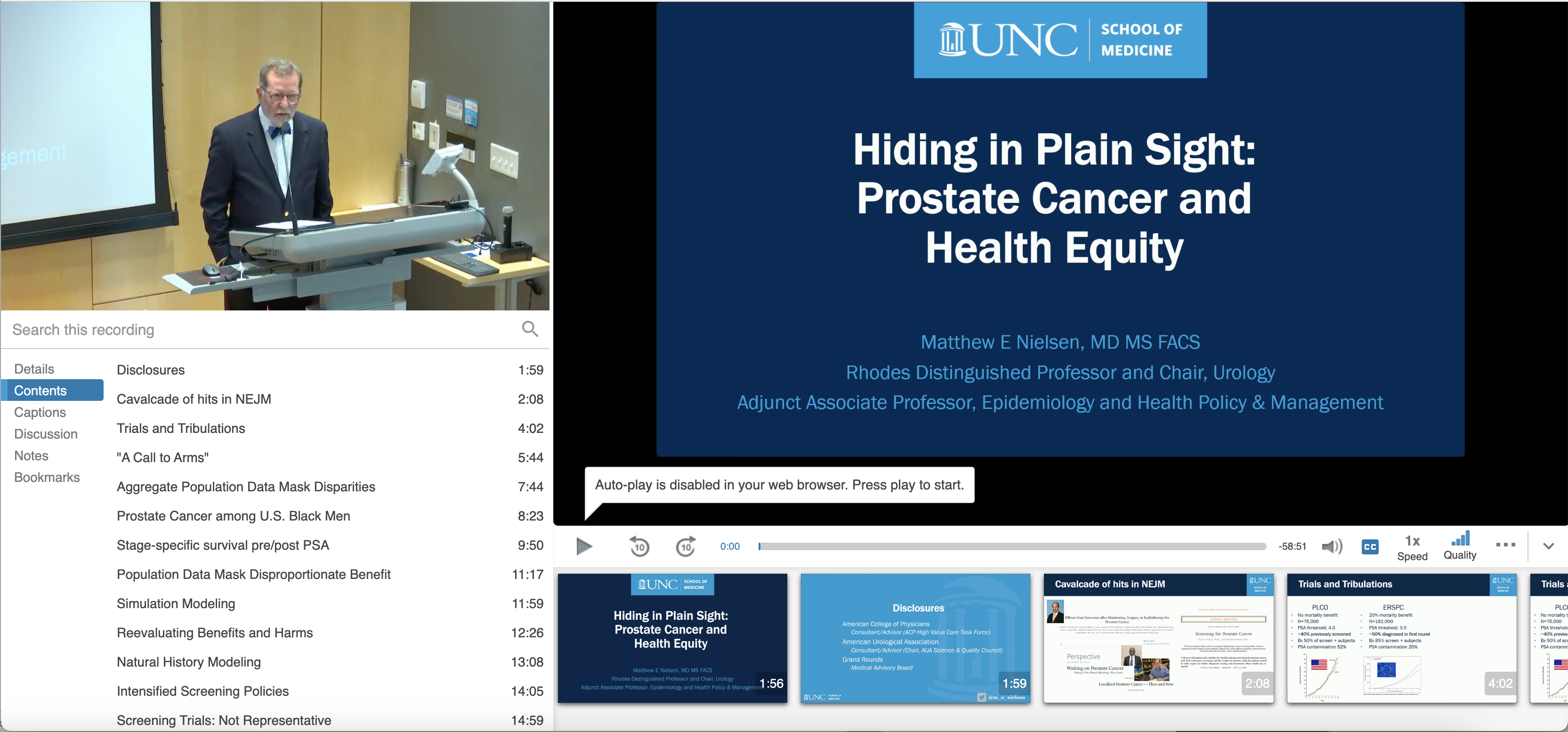On June 15, Dr. Matthew Nielsen Chair of the Department of Urology and John Sloan Rhodes and John Flint Rhodes Distinguished Professor of Urology at UNC, delivered a thought-provoking presentation titled “Hiding in Plain Sight: Prostate Cancer and Health Equity” at the UNC Department of Medicine’s Grand Rounds. In his talk, Dr. Nielsen explored the intersection of prostate cancer and health equity, aiming to raise awareness about the disparities in prostate cancer research, diagnosis, treatment, and outcomes. Prostate cancer is the most common cancer in men in the U.S. Prostate cancer is 1.7 times more likely to develop in men identifying as Black and prostate cancer mortality rates are 2-4 times greater among Black men, as compared to men of other racial groups. Nielsen reviewed research suggesting Black men may disproportionately benefit from earlier and more intensive prostate cancer screening and highlighted multiple opportunities to address these longstanding disparities through novel clinical algorithms, educational programs, and shared decision making.

Matthew Nielsen, MD, MS, FACS
Professor and Chair of Urology
Grateful to the master connector/convener @HelenBurstin for the opportunity to join important @theNAMedicine discussion on Reconsidering Race in Clinical Algorithms #EquityInEquations pic.twitter.com/e7HWGfJqDe
— Matt Nielsen, MD (@m_e_nielsen) June 27, 2023
On June 27, Dr. Nielsen was invited to join a symposium at the National Academies of Medicine entitled, Reconsidering Race in Clinical Algorithms: Driving Equity through New Models in Research and Implementation. A number of historical clinical algorithms were reviewed, where the inclusion of race in the risk models may unintentionally exacerbate health disparities. Prostate cancer screening was highlighted as one area where race might be incorporated into clinical algorithms in ways that could potentially mitigate longstanding disparities in prostate cancer. Nielsen and colleagues at the American Urological Association are pursuing a body of work aligned with the emerging field of Diagnostic Excellence, incorporating this and other areas of urology care amenable to enhancing the care of the population.
Things to Know About Prostate Cancer
Dr. Nielsen’s presentation shed light on the glaring disparities in prostate cancer outcomes across different populations. Unfortunately, various factors contribute to the unequal burden of prostate cancer, including race, socioeconomic status, and geography. In a UNC Health Talk article, Dr. Nielsen covered three things that all men, and their healthcare providers should know about prostate cancer.
Health Disparities:
Grateful to amazing speakers & attendees at race and clinical algorithms convening @theNAMedicine co-sponsored by @CMSSmed @DorisDukeFdn @MooreFound
Cross-cutting discussions across research, clinical, and AI/ML communities will more rapidly catalyze change #EquityinEquations pic.twitter.com/9komRLDrvO
— Helen Burstin, MD, MPH, MACP (@HelenBurstin) June 29, 2023
Prostate cancer exhibits notable disparities, particularly in the higher incidence among Black men. It is important for medical professionals to recognize that Black men, even in the absence of a family history, face an increased risk of both diagnosis and mortality from prostate cancer compared to other racial groups. This highlights the need for targeted efforts to address this disparity.
Screening Advancements:
Medical professionals should stay informed about the latest screening options for prostate cancer. While the prostate-specific antigen (PSA) blood test remains a common method, it is important to consider potential false positives and the need for further testing. Prostate MRI has emerged as a noninvasive option that can provide more precise information for targeted biopsies, enhancing diagnostic accuracy.
Active Surveillance:
It is crucial for medical professionals to understand that not all prostate cancer cases require immediate treatment. Active surveillance, as a management strategy, involves close monitoring of low-risk prostate cancer to avoid unnecessary treatment and its associated side effects. Professionals should be well-versed in identifying suitable candidates for active surveillance and assessing cancer progression over time.
More About Dr. Matthew Nielsen
The clinical practice of Matthew Nielsen, MD, MS, FACS is focused on urologic oncology. His expertise in this area aligns with his research interests, which include medical decision-making, cancer care quality, and treatment outcomes.
In addition to his clinical and research roles, Dr. Nielsen is actively involved in improving the quality and safety of healthcare services. He serves as the Associate Director of the UNC Institute for Healthcare Quality Improvement and holds the position of UNC Faculty Physicians’ Director of Quality. He has assumed leadership positions within the American Urological Association (AUA) as Chair of the Quality Improvement and Patient Safety Committee and Chair of the Science and Quality Council.
Dr. Nielsen has also contributed to the advancement of healthcare quality through his involvement in organizations such as the American College of Physicians, where he served on the High-Value Care Task Force and Performance Measurement Committee. Dr. Nielsen was also appointed to the Centers for Medicare and Medicaid Services Technical Expert Panel for the CMS Quality Measure Development Plan and Quality Measure Index in 2019.

